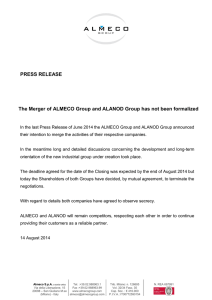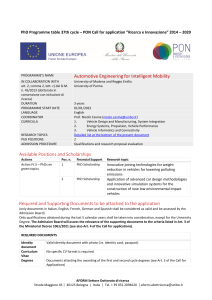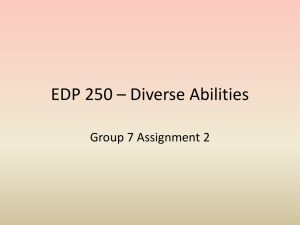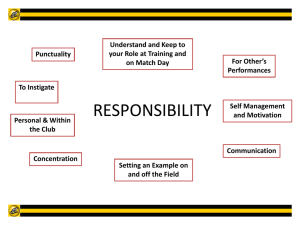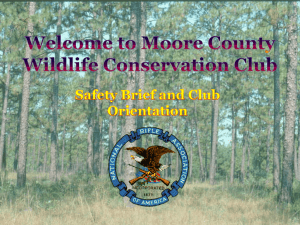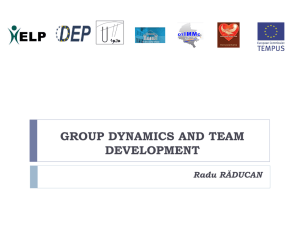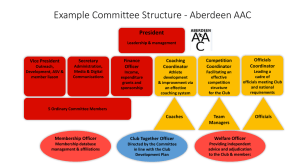279 Journal club lab: an educational workshop experience
advertisement
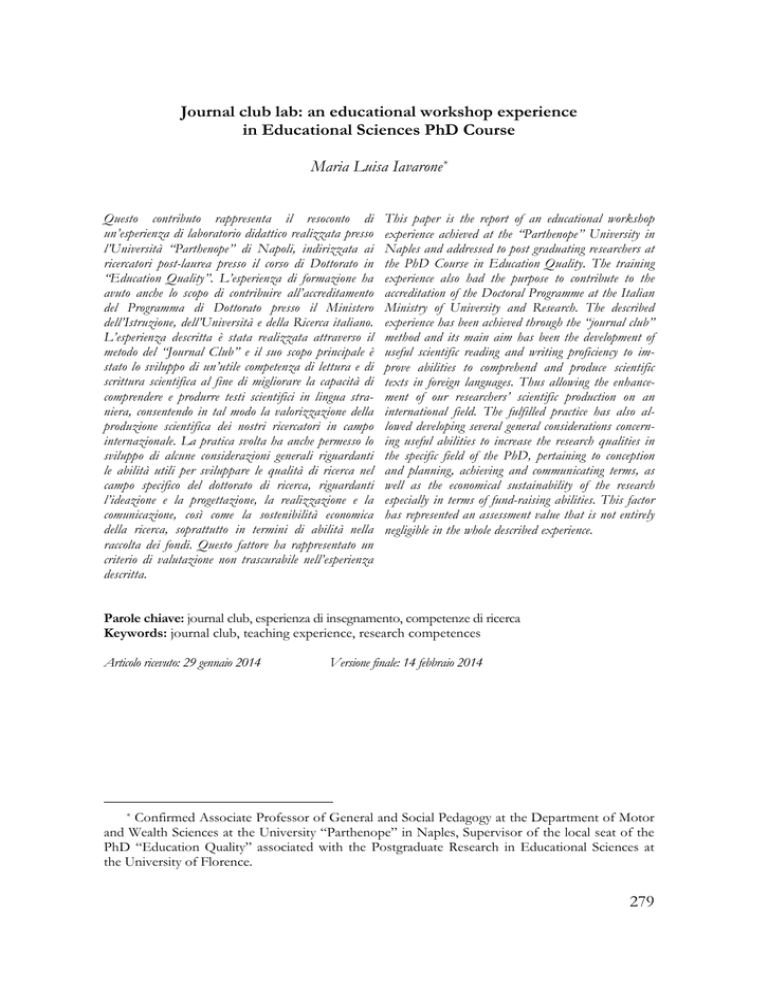
Journal club lab: an educational workshop experience in Educational Sciences PhD Course Maria Luisa Iavarone* Questo contributo rappresenta il resoconto di un’esperienza di laboratorio didattico realizzata presso l’Università “Parthenope” di Napoli, indirizzata ai ricercatori post-laurea presso il corso di Dottorato in “Education Quality”. L’esperienza di formazione ha avuto anche lo scopo di contribuire all’accreditamento del Programma di Dottorato presso il Ministero dell’Istruzione, dell’Università e della Ricerca italiano. L’esperienza descritta è stata realizzata attraverso il metodo del “Journal Club” e il suo scopo principale è stato lo sviluppo di un’utile competenza di lettura e di scrittura scientifica al fine di migliorare la capacità di comprendere e produrre testi scientifici in lingua straniera, consentendo in tal modo la valorizzazione della produzione scientifica dei nostri ricercatori in campo internazionale. La pratica svolta ha anche permesso lo sviluppo di alcune considerazioni generali riguardanti le abilità utili per sviluppare le qualità di ricerca nel campo specifico del dottorato di ricerca, riguardanti l’ideazione e la progettazione, la realizzazione e la comunicazione, così come la sostenibilità economica della ricerca, soprattutto in termini di abilità nella raccolta dei fondi. Questo fattore ha rappresentato un criterio di valutazione non trascurabile nell’esperienza descritta. This paper is the report of an educational workshop experience achieved at the “Parthenope” University in Naples and addressed to post graduating researchers at the PhD Course in Education Quality. The training experience also had the purpose to contribute to the accreditation of the Doctoral Programme at the Italian Ministry of University and Research. The described experience has been achieved through the “journal club” method and its main aim has been the development of useful scientific reading and writing proficiency to improve abilities to comprehend and produce scientific texts in foreign languages. Thus allowing the enhancement of our researchers’ scientific production on an international field. The fulfilled practice has also allowed developing several general considerations concerning useful abilities to increase the research qualities in the specific field of the PhD, pertaining to conception and planning, achieving and communicating terms, as well as the economical sustainability of the research especially in terms of fund-raising abilities. This factor has represented an assessment value that is not entirely negligible in the whole described experience. Parole chiave: journal club, esperienza di insegnamento, competenze di ricerca Keywords: journal club, teaching experience, research competences Articolo ricevuto: 29 gennaio 2014 Versione finale: 14 febbraio 2014 * Confirmed Associate Professor of General and Social Pedagogy at the Department of Motor and Wealth Sciences at the University “Parthenope” in Naples, Supervisor of the local seat of the PhD “Education Quality” associated with the Postgraduate Research in Educational Sciences at the University of Florence. 279 1. THE THEORETICAL-METHODOLOGICAL FRAMEWORK The teaching experience has been achieved through the “journal club” method, a technique employed in several European research centres, especially biomedical, to analyse, discuss, and criticise scientific texts. At the moment no documentation about practices employing this method in human sciences research is available in our country; this evidence has therefore become a winsome challenge to be employed within our disciplines. The journal club method with educational aims is functional to the creation of cohesion and teamwork abilities, pulling together small groups in order to find any interesting literature, critically assess it and apply it to real contexts and to research situations. In other words the method turns to be an efficient tool to concretely acquire abilities to link theory and practice. More systematically we can affirm that the main aims of the mentioned methodology are: - focus on the most important subjects, problems, and debates of the current scientific literature in a specific field; - start a critical reading of a scientific text with particular attention to methodological issues; - foster the literature update and the improvement of scientific knowledge in the trained young people; - get acquainted with research methodologies and data analysis that are different from those that are usually used in one’s specific research field. Technically the journal club activity is generally planned according to several determined phases. Firstly a part of the teachers college board selects some prestigious national and international magazines in the field of research and PhD subjects. The selection is then shared at the presence of graduate students. Periodically (monthly or every two months) a specific subject or a research issue is chosen to be confronted through the study of selected papers about that particular topic. Papers are selected using alternatively different research methods (theoretical, empirical, experimental, etc.) In our PhD this step is digitally performed. Following the graduate students gather in small groups and start a critical reading of the paper in order to prepare a PowerPoint presentation to return to the workshop host. Also this step is digitally performed. Finally the various presentations are discussed and debated in front of more workgroups. 280 2. THE TEACHING EXPERIENCE: METHODOLOGY AND ORGANIZATION The teaching experimentation has been structured in three steps: 1st step – The journal club methodology is included in the educational activities of graduate students and graduates who are involved in the research at different levels aiming to develop critical reading abilities on scientific texts. 2nd step - The journal club methodology is employed to obtain a scientific literature workshop where critical and reflexive abilities can be exploited, competences that have developed during the 1st step to enhance scientific reading and writing also aiming to improve original research abilities. 3rd step – The workshop activities’ products are shared and exchanged among the different participants in order to build a database of teaching prototypes to be used as teaching good practice examples in the following workshops. The workshop consisted in four phases: 1st PHASE. It consisted in the presentation of the establishing aspects of the journal club lab methodology in order to share its teaching aims, putting into perspective the coming out teaching benefit. The first meeting has therefore clarified the analysis of some scientific papers typologies and subsequently documentation has been organised. The teaching offer technically consisted in a selection of papers about research subjects in the scientific and disciplinary fields of the PhD, with reference to four kinds of scientific writing. 1. critical paper-review (philosophical-epistemological approach); 2. empirical-descriptive paper-survey (sociological approach); 3. analytical-interpretative paper (psychological approach); 4. applicative-methodological paper (teaching- pedagogical approach). The analysis objective has aimed to urge the confrontation among different types of scientific texts, sometimes very different one from the other, especially in language, methods, logical structure and design and, of course, topic or analysed issue. This urging has been thought in order to “force” a critical reading of scientific contributions in order to get acquainted with research methodologies and data analysis that are different from those that are usually used in one’s specific research field. For each paper typology (the “critical essay” or the “empirical-descriptive survey”... etc) several contributions on the same subject or issue have been supplied. During the second meeting, thanks to the supplied and shared inputs and thanks to the study of the proposed documentation, each workshop participant has operated a double option: 1. according to the paper typology (see clauses 1, 2, 3, 4) 281 2. according to the research subject that could be the one proposed by the host (referring to the selection of supplied papers) or autonomously identified by a single or by a small group of graduate students based on personal research interests, eventually pertinent with the postgraduate dissertation. In the latter hypothesis the graduate students have also had the task to identify papers relating to the personal interest topic, on the base of previously determined criteria (national and international relevance and prestige of the magazines, impact factor, references, etc.) Based on that double option the workshop participant has prepared a presentation of the chosen or allocated topic or research issue. The PowerPoint presentation consisted in a number of slides compatible with an “oral or conference communication” of about 20-25 minutes (a 20 minutes’ “speech” and 5 minutes’ “question time”) for a maximum number of about 10-12 slides. This work’s aim has been to train the researcher to an “efficient scientific communication”, like often stressed by the international research training and also highlighted by the Doctoral Programmes for the European Knowledge Society Report, included in the Bergen Statement of 2005. 2nd PHASE The second phase has consisted in the ongoing supervision of the activities, through the critical revision of the participants’ topic presentations. Those presentations have been developed around one topic or research issue and built up as a review of 4 or 5 papers all pertinent to the same type of paper (either just “critical essay” or just “empirical-descriptive survey”). This option has been necessary in this phase in order to avoid the disorientating interpretations. As a matter of fact the same issues/phenomena faced with different interpretations and methods often produce “epistemological mistakes” so that data and languages that are naturally incomparable are erroneously compared. This phase has also aimed to share and re-negotiate efficiency criteria to build a quality scientific communication; the developed criteria partially included in the already mentioned Bergen Statement of 2005, have been further debated and expanded by the participants’ groups with reference to a series of “features” that the presentations “had to include”: - cover including the title of the contribution, name of the author/s, indication of the establishment/s (University, research centre) origin of the work - conceptual index of the presentation - introduction to the topic (context, scientific foundation, reference literature) - presentation of the study objectives (drawing up or innovative and original contribution with reference to the field’s literature) - submission of the presented work type (i.e. bibliographic study, empiric survey, experimental research, ….) 282 - presentation of employed methods (key factors and weak points of the methodological option) - assessments and conclusions (critical considerations with reference to: model, methodology, assessment system) - follow up and further developments of the study - bibliography In other words, the fore mentioned list of methodological indications has been used as a sort of “check-list for an efficient scientific communication” to be observed creating the topic presentation for a “better performance”, especially with reference to clarification, comprehension, and fluidity of the communication. 3rd PHASE The main objective of the third phase has been to foster the literature update and the improvement of scientific knowledge in the trained young people through the use of dissimilar research contributions of different kinds in order to encourage interdisciplinary research abilities. Starting from the monitoring completed in the previous phase and thanks to the criteria sharing (check-list for an efficient scientific communication) creating the presentation, this goal has been achieved stimulating the graduate students to put together the analysis of the chosen topic, with contributions of theoretical origin and of methodological plan deliberately chosen because they were very different one from the other. This has aimed to force to a systemic reading of the research issues under a trans- and inter-disciplinary view. 4th PHASE The macroscopic aim of the fourth phase has been to foster the ability of the graduate students to present their research work in public in a correct theoretical and methodological way, specifically attentive about the efficiency of communication. This exercise had to be performed within a simulated conference inside a real event and has been considered a “rehearsal” of the final PhD dissertation discussion aiming to get the graduate student acquire enough confidence and familiarity with questions and clarification requires on some aspects of their work. This phase also had another not less important objective: to help graduate students to enhance assessment and critical abilities and not just towards the work of thirds (in the final conference simulation graduate students are involved as critical observers) but above all in front of their own work and the training benefits produced in the workshop. The following diagram shows the workshop’s organization Planning: 283 3. CONCLUSIONS The journal club lab experience has produced an important outcome. It has not only performed scientific training benefits for the participants but above all it has implied an update of the reflection on the university teaching tools and particularly on the research training teaching. The best results have nevertheless concerned manpower. On one hand the workshop has in fact been prevailingly orientated to create rational benefits for the research, particularly implying the “explicit objectives” of the workshop, which means to develop critical, reflective abilities thus enhancing creative writing abilities in developing an original research topic with interdisciplinary features. On the other hand some evident benefits have been recorded especially in the achievement of the so called “implicit objectives” referring to the workshop and above all the issues originated by the teamwork, renegotiating and redefining values and meanings of the different research fields and circles. Especially with reference to the latter aspect it is necessary to stress that the encountered difficulties are naturally legitimate but also physiologic and productive. The attentive job behind the educational process imposes whatsoever the rethinking of excessively prescriptive and sometimes axiomatic positions. In order to be productive the research educational work has to be not only conscious284 ly decentralized, but also emotionally and relationship-wise; even a possible crises determined during this process, represents a precious step in the education research creative process that can be considered a powerful push towards the modification of one’s thought style, reconsidering the personal knowledge processes and enhancing one’s personal world view. The journal club lab has tried to internalize these objectives and the whole work has been designed and achieved in this perspective. The assessment of the workshop has had a strong human meaning: the developed reactions at this level in fact other than the single assessment of the work achieved by the participants have reflected the true desire of the graduate students to be profitably fostered during their cultural and educational research growing path. Everyone has therefore had the possibility to work to the best of their abilities gaining ethical and human values during the workshop, values that the research is going to need more and more. RIFERIMENTI BIBLIOGRAFICI ADI (by), Cervelli in fuga. Storie di menti italiane fuggite all’estero, Roma. Avverbi edizioni, 2001. AVVEDUTO S. (by), Il dottorato di ricerca esperienze e prospettive, Roma, Cnr, 1994. AVVEDUTO S., BRANDI M. C., Risorse umane: quale futuro nella scienza? Formazione e occupazione, Milano, Franco Angeli, 2000. AVVEDUTO S., CIPOLLONE P. E., La mobilità delle intelligenze in Europa. Internazionalizzazione della formazione e dottorato di ricerca, Milano, Franco Angeli, 1998. BARROWS, H.S., A Taxonomy of Problem Based Learning Methods, Medical Education, 20, 481-486, 1986. BARROWS, H.S., The Tutorial Process, Springfield, IL: Southern Illinois University School of Medicine, 1992. BIANCHI F., Risorse umane e formazione: caratteri e prospettive dell’istruzione, Milano, Franco Angeli, 2004. CALVANI A., VARISCO B.M. (by), Costruire decostruire significati, Padova, CLEUP, 1995. CAMBI F., OREFICE P. by), Fondamenti teorici del processo formativo. Contributi per un’interpretazione, Napoli, Liguori, 1996. CERUTI M., PRETA L., Che cos’è la conoscenza, Laterza, Roma-Bari, 1990. CESARATTO S., AVVEDUTO S., BRANDI M. C., STIRATI A., Il brutto anatroccolo. Il dottorato di ricerca in Italia fra università, ricerca e mercato del lavoro, Milano, Franco Angeli, 1994. Directorate-General for the Internal Market and Services, European Commission, Citizens first Studying, training and doing research in another country of the European Union, Bruxelles-Luxembourg, 1996. 285 European Commission, The role of the universities in the Europe of Bruxelles, Com 58, 1993. European Commission, A memorandum on lifelong training (Commission Services’ Work Papers, Bruxelles, 30.10.2000, SEC(2000) 1832) Lisbon European Council, Council Chairman closing remarks, Press Release, Lisbon 24/3/2000, Nr. 100/1/00 CORBI E., OLIVERIO S., SIRINGANO F.M., L’engagement pedagogico, Napoli, Liguori, 2008. D’ADDONA G., DI LISIO R., MATARAZZO F., Il Dottorato di ricerca, Roma, La Nuova Italia Scientifica, 1983. DELORS J., Unesco, Nell’educazione un tesoro, Roma, Armando, 1997. GEMMA C., Il dottorato di ricerca. Per una teorizzazione delle pratiche formative, Roma, Carocci, 2006. GRADSTEIN, M., JUSTMAN, M., MEIER, V., The Political Economy of Education. Implications for Growth and Inequality, MIT Press, Massachusetts, 2004. IAVARONE M. L., Altra formazione per lo sviluppo educativo locale, Liguori, Napoli, 2009. LEONE A., MORETTI P., Formazione continua e ricerca nell’università, Cagliari, CUEC, 2007. LÉVY P., L’intelligenza collettiva, Milano, Feltrinelli, 1996. MORIN E., CIURANA E.R., MOTTA D, Educare per l’era planetaria. Il pensiero complesso come metodo di apprendimento, Roma, Armando, 2004. MORIN E., Il metodo. L’identità umana, Milano, Raffaello Cortina Editore, 2002. Oecd, Politiche nazionali della scienza e della tecnologia, Italia, Edizione italiana a cura del Murst, Roma, Istituto Poligrafico Zecca dello Stato,1992. CHI M.T.H., GLASER R., FARR M.J., The Nature of Expertise, Hillsdale, Lawrence Erlbaum, 1988. SAVERY, J. R. & DUFFY, T. M., Problem Based Learning: An instructional model and its constructivist framework. CRLT Technical Report, no. 16-01, 2001. SCHWARTZ, P. MENNIN S., WEBB, G. (Eds.)., Problem Based-Learning: Case Studies, Experience and Practice, Taylor & Francis Group, 2001. SEN A., Lo sviluppo è libertà. Perché non c’è crescita senza democrazia, Milano, Mondadori, 2000. STEFANI E., Qualità per l’università, Milano, Franco Angeli, 2006. WOODS, D. R., Problem-based Learning: How to Gain the Most from PBL, Waterdown, ON, Donald R. Woods, 1994. 286 RECENSIONI E SEGNALAZIONI
